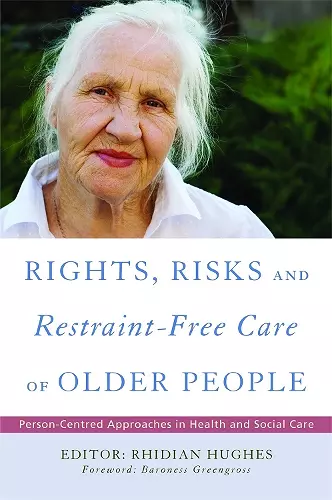Rights, Risk and Restraint-Free Care of Older People
Person-Centred Approaches in Health and Social Care
Format:Paperback
Publisher:Jessica Kingsley Publishers
Published:15th Dec '09
Currently unavailable, and unfortunately no date known when it will be back

An authoritative and practical resource on the ethics and use of restraint in the care of older people across health and social care
This book provides health and social care professionals with an authoritative reading resource on the ethics and use of restraint. It provides an overview of the different forms of restraint, the conditions under which they are used, and their implications for the health and wellbeing of older people.
The restraint of older people is a pressing issue for health and social care practice. This book provides health and social care professionals with an authoritative reading resource on the ethics and use of restraint.
The book provides an overview of the different forms of restraint, the conditions under which they are used, and their implications for the health and wellbeing of older people. Practical approaches to minimising are then explored, underlining the importance of person-centred care. Innovative programmes and approaches to reducing the use of restraint from around the world are described and assessed, and case studies are drawn upon to highlight practice challenges and their effective resolutions. The perspectives of older people and their carers and families, as well as of professionals, commissioners and regulators of health and social care, are also taken into account. The contributors are drawn from an international range of health and social care settings, as well as from the academic world.
This in-depth volume will help health and social care professionals better understand the complex issues that surround the use of restraint, support practice that puts older people at the centre of decision-making about their care, and enable services to provide safer and more appropriate care.
the volume's contributors profusely shower a considerable swath of the research field of restraint of older people with the intellectually nourishing rain of informative discourse, discerning criticism, and a plethora of expert opinions and suggestions. The efforts of the contributors may help nurture further research investigation of this issue ridden field.
The long list of persons who may learn much from this highly instructive volume includes: patient advocates, psychiatrists, neuropsychiatrists, geriatric psychiatrists, forensic psychiatrists, psychologists, clinical psychologists, psychoanalysts, psychotherapists, cognitive therapists, behavioral therapists, neurologists, neurosurgeons, nurses, psychiatric nurses, rehabilitation nurses, emergency room nurses, gerontologists, geriatric medicine specialists, long term care specialists, physical medicine and rehabilitation specialists, medicolegal specialists, hospice workers, nursing home personnel, hospital administrators, social workers, social scientists, sociologists, medical ethicists, philosophers, public health professionals, occupational therapists, physical therapists, vocational therapists, physiotherapists, recreation therapists, orthopedic surgeons, emergency room physicians, primary care physicians, pharmacists, pharmacologists, civil liberties lawyers, healthcare lawyers, criminal justice professionals, judges, health regulators, health policy makers, legislators, and risk managers.
Alternatives to restraint and new programs for reducing the use of restraint are described in chapters that outline all the issues involved in providing safe environments for elders. Very highly recommended!... It shows how a simple four-step method can be applied to the typical ADD/ADHD child to teach even the most disorganized, hyperactive child how to make their bed, get ready for school, and get organized. These step-by-step strategies offer routines that aren't boring and ARE positive, keyed to realistic demands and rules governed by fun and individualism. -- The Midwest Book Review
There are still too many care homes where residents are not free to move around. They are "restrained" by door locks and key pads or by being belted into wheelchairs, or simply told to "sit down". Most of it arises because the culture of the home remains controlling and risk-averse. Rights, Risks and Restraint-Free Care will help managers and staff to think through the risks and ethics of restraint and find ways to free residents from the institutional bonds that make them prisoners in what is supposed to be their "home". There are some excellent case studies (many from other countries) which are ideally suited for use in training sessions. -- Caring Times
I hope this book will be widely read. It encourages us to question our motives if ever we are faced with difficult situations when caring for people to whom it is sometimes very difficult to relate, but people who nevertheless need our care and understanding at the most vulnerable period of their lives as they draw to a close. -- Baroness Greengross
This thought-provoking book challenges us all to re-examine our personal attitudes when caring for older people. At its heart lies a desire to improve relationships, quality of life and holistic well-being. -- Barbara Pointon, Ambassador for the Alzheimer's Society and for the charity 'for demen
ISBN: 9781843109587
Dimensions: 228mm x 154mm x 11mm
Weight: 324g
224 pages